Homelessness charities have warned that using new antisocial behaviour powers to crack down on rough sleeping could force those in need away from vital services, after a London council became the first to introduce them.
Under a public space protection order (PSPO) introduced by Hackney council at the end of April, rough sleepers in some areas of the east London borough could face a £100 fixed penalty notice or be taken to court and fined up to £1,000.
The council said it had not set out to criminalise homelessness and but charities working with rough sleepers said they feared the move could lead to counter-productive arrests or fines.
On Monday, Oxford city council said it would not include rough sleepers in a PSPO in the city centre, saying a consultation had indicated it was not likely to be the most effective way of tackling the problem. It said the proposed PSPO would not have included all rough sleepers, but a small number of people who continued to sleep rough in the city centre despite having accommodation.
Local groups had lobbied the city council to drop the plans, which they said could force homeless people away from the services set up to help them. A petition against the move attracted more than 72,000 signatures.
PSPOs were introduced in 2014 to give councils more powers to tackle antisocial behaviour. So far councils have primarily used them to target street drinking, but other activities including busking and taking legal highs in public have also been considered for inclusion.
Hackney council said its PSPO was designed to tackle antisocial behaviour linked to street drinking and persistent rough sleeping. The order allows police or council officers to ask people to stop doing a range of things, from begging to having a dog off a lead causing a nuisance, including “sleeping rough in doorways or other public places”.
The council’s announcement of the new order stated that “enforcement action is always the last option”.
It added: “Officers will put rough sleepers in contact with organisations that make sure they get the medical attention that they need, and help with housing.”
The council’s deputy mayor, Sophie Linden, said it was not setting out to criminalise homelessness.
“The welfare of every vulnerable person is of highest importance to us. We are trying to tackle persistent antisocial behaviour that is concentrated in specific areas and having an adverse effect on the lives of residents and visitors to the area,” she said.
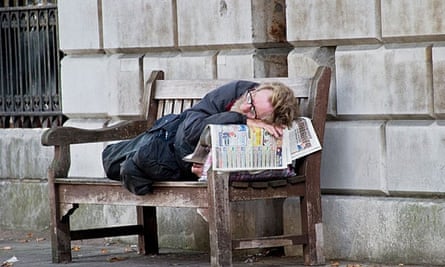
“We are trying to help people off the streets and into housing and support. Our community wardens go out accompanied by specialist outreach workers, and rough sleepers are all offered support and a bed.”
Linden said the PSPO followed months of work by the police and council to deal with persistent rough sleepers and ongoing antisocial behaviour in parts of the borough including St John’s Churchyard, which is also covered by the order.
“Everyone should be able to enjoy and make use of the many public spaces that we have in our borough. Persistent street drinking and rough sleeping has been part of the antisocial behaviour in this area. People are urinating in the street, defecating in the churchyard, fighting and being abusive to members of public and spitting on passers-by,” she added.
However the order, which covers Hackney Downs, London Fields, Broadway Market, Mare Street and Regent’s Canal, was criticised by those working with homeless people.
Connor Johnston, a barrister specialising in homelessness and a Hackney resident, said he was concerned by the council’s decision to use a PSPO in this way, and that the move was “redolent of the Vagrancy Act 1824” which criminalises begging.
“The purpose of these orders is to clamp down on antisocial or nuisance behaviour that impacts on the quality of life of those in the locality. There is nothing inherently antisocial about a person being forced to sleep rough and we should not be criminalising it,” he said.
“The effect of it is simply going to be to shunt homeless people to another borough. This won’t solve anything beyond making our streets a bit ‘shinier’ and will almost certainly just make it harder for those sleeping rough to access the support services they rely on.”
The charity Crisis said it was concerned by any measure that could make life more difficult for rough sleepers, who were more likely to be victims of crime than perpetrators, and had an average age of death of just 47.
Its director of policy and external affairs, Matt Downie, urged councils not to criminalise rough sleeping and homelessness.
He said: “While it’s right that the police have the power to tackle genuine criminals, covering a complex issue with a wide-ranging PSPO could lead to people in dire need of support facing a counterproductive arrest or fine.
“Rough sleepers deserve better than to be treated as a nuisance – they may have suffered a relationship breakdown, a bereavement or domestic abuse. Instead, people need long-term, dedicated support to move away from the streets for good.”
Mark McPherson, of Homeless Link – an umbrella charity for groups working with homeless people around England, said the use of PSPOs did little to tackle the root causes of rough sleeping.
“Those who sleep on the streets are extremely vulnerable and often do not know where to turn for help. These individuals need additional support to leave homelessness behind, and any move to criminalise sleeping rough could simply create additional problems to be overcome,” he said.
“If local authorities are concerned about people sleeping on their streets we would urge them to work with local homelessness charities and authorities to connect people with the structured help they need to get off the streets for good.”
Councils have to consult with local police before they can introduce a PSPO, and be satisfied that the activity they are banning has a detrimental effect on the local community and justifies the restrictions imposed. The orders last for three years, with a review each year.
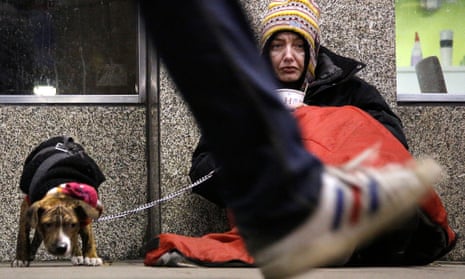
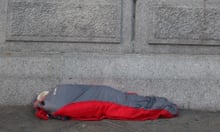

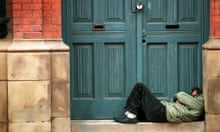


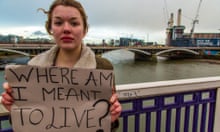
Comments (…)
Sign in or create your Guardian account to join the discussion